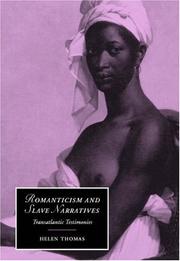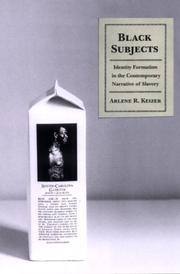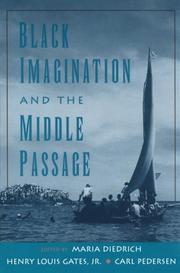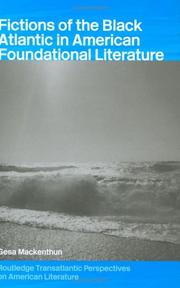Book
ISBN: 9781609387785 1609387783 Year: 2021 Publisher: Iowa City University of Iowa Press
Abstract | Keywords | Export | Availability | Bookmark
 Loading...
Loading...Choose an application
- Reference Manager
- EndNote
- RefWorks (Direct export to RefWorks)
"Collusions of Fact and Fiction is the first book-length study in the field to discuss the works of Suzan-Lori Parks and Kara Walker in conjunction with each other and to establish them as exemplary for a larger generational shift in how late twentieth century African American artists have been addressing the histories and legacies of New World slavery"--
Slave trade in literature --- Slave trade in art --- African Americans in literature --- African Americans in art --- Black people in literature --- Black people in art --- African Americans --- Black people --- Intellectual life --- Parks, Suzan-Lori --- Walker, Kara Elizabeth. --- Criticism and interpretation.
Book
ISBN: 9780821419953 Year: 2012 Publisher: Athens, Ohio : Ohio University Press,
Abstract | Keywords | Export | Availability | Bookmark
 Loading...
Loading...Choose an application
- Reference Manager
- EndNote
- RefWorks (Direct export to RefWorks)
Littérature africaine de langue anglaise --- Esclaves --- West African literature (English) --- Slave trade in literature. --- Histoire et critique. --- Dans la littérature. --- History and criticism. --- Slave trade in literature --- #SBIB:39A5 --- #SBIB:39A73 --- #SBIB:39A8 --- English literature --- History and criticism --- Kunst, habitat, materiële cultuur en ontspanning --- Etnografie: Afrika --- Antropologie: linguïstiek, audiovisuele cultuur, antropologie van media en representatie --- Littérature africaine de langue anglaise --- Dans la littérature.
Book
ISBN: 9780814212622 081421262X 081427322X Year: 2014 Publisher: Columbus : The Ohio State University Press,
Abstract | Keywords | Export | Availability | Bookmark
 Loading...
Loading...Choose an application
- Reference Manager
- EndNote
- RefWorks (Direct export to RefWorks)
The starting point for this study is the nineteenth-century Caribbean narrative The History of Mary Prince (1831). Simmons puts Prince's narrative in conversation with three twentieth-century novels: Zora Neale Hurston's Their Eyes Were Watching God, Gloria Naylor's Mama Day, and Maryse Condé's I, Tituba, Black Witch of Salem. She incorporates autobiography theory to shift the critical focus from the object of study--slave histories--to the ways people talk about those histories and to the guiding interests of such discourses. In its reframing of women's migration narratives, Simmons's study unsettles theoretical certainties and disturbs the very notion of a cohesive diaspora.
American literature --- West Indian literature (English) --- African American women in literature. --- African Americans in literature. --- Slave trade in literature. --- Collective memory in literature. --- Culture in literature. --- African American authors --- History and criticism. --- African American women --- Women authors --- Afro-American women in literature --- English literature --- Agrarians (Group of writers) --- West Indian literature --- Afro-Americans in literature --- Negroes in literature

ISBN: 1107118514 128334212X 9786613342126 1139159763 1139155202 0511048963 051115108X 0511010583 9780511010583 0521662346 9780521662345 0511033729 9780511033728 9780511151088 9781139155205 9781107118515 6613342122 9781139159760 9780511048968 9780521604567 Year: 2001 Publisher: Cambridge Cambridge university press
Abstract | Keywords | Export | Availability | Bookmark
 Loading...
Loading...Choose an application
- Reference Manager
- EndNote
- RefWorks (Direct export to RefWorks)
The first major attempt to relate canonical Romantic texts to the African diaspora, this study explores connections with literature produced by slaves, slave owners, abolitionists and radical dissenters between 1770 and 1830. Thomas reveals a dialogue between two diverse cultural spheres, and their corresponding systems of thought, epistemology and expression.
English literature --- Slavery in literature. --- American literature --- Slaves' writings, American --- Slaves' writings, English --- Antislavery movements --- African Americans in literature. --- Slave trade in literature. --- Romanticism. --- Pseudo-romanticism --- Romanticism in literature --- Aesthetics --- Fiction --- Literary movements --- Afro-Americans in literature --- Negroes in literature --- Abolitionism --- Anti-slavery movements --- Slavery --- Human rights movements --- English slaves' writings --- American slaves' writings --- Slavery and slaves in literature --- Slaves in literature --- History and criticism. --- African American authors --- Black authors --- History. --- African Americans in literature --- Romanticism --- Slavery in literature --- Slaves --- Slave trade in literature --- Enslaved persons --- Persons --- British literature --- Inklings (Group of writers) --- Nonsense Club (Group of writers) --- Order of the Fancy (Group of writers) --- Agrarians (Group of writers) --- African American authors&delete& --- History and criticism --- History --- Black authors&delete& --- Intellectual life --- Thematology --- anno 1700-1799 --- anno 1800-1899 --- 18th century --- Authors [Black ] --- 19th century --- Slaves' writings [American ] --- Slaves' writings [English ] --- English enslaved persons' writings --- American enslaved persons' writings --- Enslaved persons in literature --- Enslaved persons' writings, American --- Enslaved persons' writings, English
Book
ISBN: 080479183X 9780804791830 9780804788793 0804788790 Year: 2014 Publisher: Stanford, California : Stanford University Press,
Abstract | Keywords | Export | Availability | Bookmark
 Loading...
Loading...Choose an application
- Reference Manager
- EndNote
- RefWorks (Direct export to RefWorks)
Through a literary analysis of works from key historical moments across two hundred years, 'Monsters by Trade' traces shifting anxieties over the transformation of Spain into a slave-trader nation, formed financially and ideologically by its morally corrupt slave economy in Cuba and condemned by all other Atlantic powers. The book thus expands our present consideration of modern empire.
Spanish literature --- Slave trade in literature. --- Slavery in literature. --- Slave trade --- Slavery and slaves in literature --- Slaves in literature --- History and criticism. --- History --- Spain --- Colonies --- Enslaved persons in literature --- Espagne --- Espainiako Erresuma --- España --- Espanha --- Espanja --- Espanya --- Estado Español --- Hispania --- Hiszpania --- Isupania --- Kingdom of Spain --- Regne d'Espanya --- Reiaume d'Espanha --- Reino de España --- Reino d'Espanya --- Reinu d'España --- Sefarad --- Sepharad --- Shpanie --- Shpanye --- Spanien --- Spanish State --- Supein --- イスパニア --- スペイン

ISBN: 0801489040 Year: 2004 Publisher: Ithaca London : Cornell University Press,
Abstract | Keywords | Export | Availability | Bookmark
 Loading...
Loading...Choose an application
- Reference Manager
- EndNote
- RefWorks (Direct export to RefWorks)
Writers as diverse as Carolivia Herron, Charles Johnson, Paule Marshall, Toni Morrison, and Derek Walcott have addressed the history of slavery in their literary works. In this groundbreaking new book, Arlene R. Keizer contends that these writers theorize the nature and formation of the black subject and engage established theories of subjectivity in their fiction and drama by using slave characters and the condition of slavery as focal points. In this book, Keizer examines theories derived from fictional works in light of more established theories of subject formation, such as psychoanalysis, Althusserian interpellation, performance theory, and theories about the formation of postmodern subjects under late capitalism. Black Subjects shows how African American and Caribbean writers' theories of identity formation, which arise from the varieties of black experience re-imagined in fiction, force a reconsideration of the conceptual bases of established theories of subjectivity. The striking connections Keizer draws between these two bodies of theory contribute significantly to African American and Caribbean Studies, literary theory, and critical race and ethnic studies.
American fiction --- Slavery in literature. --- Caribbean literature (English) --- Identity (Psychology) in literature. --- African Americans in literature. --- Slave trade in literature. --- Black people in literature. --- Walcott, Derek. Dream on Monkey Mountain --- Roman américain --- Esclavage --- Littérature antillaise de langue anglaise --- Identité (psychologie) --- Noirs américains --- History and criticism. --- 20e siècle --- Dans la littérature --- Histoire et critique --- Walcott, Derek. --- Roman américain --- Littérature antillaise de langue anglaise --- Identité (psychologie) --- Noirs américains --- 20e siècle --- Dans la littérature

ISBN: 0195126408 0195126416 9786612367250 0198029195 1282367250 0195352130 9780195126402 9780195126419 0197723284 9780198029199 Year: 1999 Publisher: Oxford Oxford university press
Abstract | Keywords | Export | Availability | Bookmark
 Loading...
Loading...Choose an application
- Reference Manager
- EndNote
- RefWorks (Direct export to RefWorks)
This volume of essays examines the forced dispossession of the Middle Passage through the texts, religious rites, economic exchanges, dance and music it elicited, both on the liminal transatlantic journey and on the continent and eventual return.
African Americans in literature. --- African Americans --- American literature --- Blacks in literature. --- Caribbean literature (English) --- Slave trade in literature. --- Slave trade --- Slavery in literature. --- West Indian literature (English) --- Intellectual life. --- African American authors --- History and criticism. --- Black authors --- History. --- English-speaking countries --- History of North America --- Thematology --- United States --- 820 <73> --- -Slave trade --- -Slavery in literature --- -African Americans --- -African Americans in literature --- -Slave trade in literature --- Afro-Americans in literature --- Negroes in literature --- Slavery and slaves in literature --- Slaves in literature --- 820 <73> Amerikaanse literatuur --- Amerikaanse literatuur --- English literature --- Agrarians (Group of writers) --- Afro-Americans --- Black Americans --- Colored people (United States) --- Negroes --- Africans --- Ethnology --- Blacks --- Caribbean literature --- -History and criticism --- History --- History and criticism --- Intellectual life --- -Bibliography --- -Catalogs --- African Americans in literature --- Blacks in literature --- Slavery in literature --- Slave trade in literature --- African American intellectuals --- African American authors&delete& --- Black authors&delete& --- Black people in literature. --- American literature - African American authors - History and criticism. --- Caribbean literature (English) - Black authors - History and criticism. --- West Indian literature (English) - History and criticism. --- African Americans - Intellectual life. --- Slave trade - History. --- Enslaved persons in literature --- United States of America
Book
ISBN: 2842696484 2367813965 2367811180 9782842696481 Year: 2005 Volume: 2 Publisher: Montpellier Université Paul-Valéry-Montpellier 3
Abstract | Keywords | Export | Availability | Bookmark
 Loading...
Loading...Choose an application
- Reference Manager
- EndNote
- RefWorks (Direct export to RefWorks)
One cannot fail to be impressed by the number of works of fiction relating to slavery and the slave trade, writing back to the original slave narratives of the 18th and 19th centuries. If the African-American authors of the 1960s and 1970s are now well-known, they find an echo in works written more recently in the 1980s and 1990s by American, African, African-American and Caribbean writers. About twenty writers come under the scrutiny of renowned scholars, offering perspectives into what makes it so necessary today for writers, critics and readers alike to revisit, reassess and reappropriate the canonical texts of slavery and post-slavery literature. The specificity of this collection is to focus on neo-slave novels while bringing together African-American and Caribbean authors. On ne peut qu’être impressionné par le nombre d’œuvres littéraires de fiction qui se rapportent à l’esclavage et au commerce des esclaves, répondant ainsi aux premiers récits d’esclaves publiés aux XVIIIe et XIXe siècles. Si les auteurs africains-américains des années soixante et soixante-dix sont maintenant bien connus, toute une nouvelle vague d’écrivains Américains, Africains, Africains-Américains et Caribbéens, poursuivent et renouvèlent, depuis les années quatre-vingt et quatre vingt-dix, cette tradition. Rassemblés autour de l’œuvre d’une vingtaine d’écrivains, des universitaires de renom ouvrent, dans ce recueil, des perspectives nouvelles pour comprendre la nécessité qui poussent écrivains, critiques et lecteurs à relire, réécrire et revisiter cette littérature de l’esclavage encore aujourd’hui.
Comparative literature --- Fiction --- Thematology --- Postcolonialism in literature --- Slave trade in literature --- Slavery in literature --- Caribbean literature --- American literature --- African literature (English) --- Criticism and interpretation --- History and criticism --- Caribbean literature - Criticism and interpretation --- American literature - 20th century - History and criticism --- African literature (English) - History and criticism --- Literature --- postcolonial --- récit d’esclave --- littérature Caraïbe --- littérature Africaine-Américaine --- slave narrative --- African-American literature --- ESCLAVES --- ESCLAVAGE ET ESCLAVES DANS LA LITTERATURE --- LITTERATURE AMERICAINE --- Littérature antillaise de langue anglaise --- ROMAN ANTILLAIS DE LANGUE ANGLAISE --- ROMAN AMERICAIN --- NOIRS DANS LA LITTERATURE --- NOIRS AMERICAINS DANS LA LITTERATURE --- AUTOBIOGRAPHIE (GENRE LITTERAIRE) --- CARAÏBES --- ETATS-UNIS --- AUTEURS NOIRS --- Histoire et critique --- AUTEURS NOIRS AMERICAINS --- CARAIBES
Book
ISBN: 1317154177 1282261266 9786612261268 0754695034 9780754695035 9781282261266 6612261269 9780754667674 0754667677 9781315576053 9781317154167 9781317154174 9781138262102 1315576058 1317154185 1138262102 Year: 2009 Publisher: Farnham Surrey, England ; Burlington : Ashgate,
Abstract | Keywords | Export | Availability | Bookmark
 Loading...
Loading...Choose an application
- Reference Manager
- EndNote
- RefWorks (Direct export to RefWorks)
Srividhya Swaminathan examines contemporary books, pamphlets, and literary works to trace the changes in rhetorical strategies utilized by both sides of the abolitionist debate. Suggesting that the debate to abolish the slave trade helped to construct a British national identity and character, she reads the arguments of pro- and anti-abolitionists as a series of dialogues among diverse groups at the center and peripheries of the empire.
English literature --- Slavery in literature. --- Antislavery movements --- English language --- Antislavery movements in literature. --- Slave trade in literature. --- Abolitionism --- Anti-slavery movements --- Slavery --- Human rights movements --- Slavery and slaves in literature --- Slaves in literature --- History and criticism. --- History --- Rhetoric. --- Mouvements antiesclavagistes --- Traite des esclaves --- Caractère national anglais. --- Esclavage --- Identité collective --- Littérature anglaise --- Langage politique. --- Politique et littérature. --- Colonies britanniques. --- Dans la littérature. --- Abolition --- Thèmes, motifs. --- Germanic languages --- Enslaved persons in literature --- Colonies britanniques --- Caractère national anglais. --- Identité collective --- Littérature anglaise --- Politique et littérature. --- Dans la littérature. --- Thèmes, motifs. --- Geschichte 1759-1815 --- Englisch

ISBN: 0415333024 9780415333023 0415758858 1134318618 128017112X 0203412648 113431860X 9780203412640 Year: 2004 Volume: 4 Publisher: London ; New York : Routledge,
Abstract | Keywords | Export | Availability | Bookmark
 Loading...
Loading...Choose an application
- Reference Manager
- EndNote
- RefWorks (Direct export to RefWorks)
This book is a significant contribution to existing research on the themes of race and slavery in the founding literature of the United States. It extends the boundaries of existing research by locating race and slavery within a transnational and 'oceanic' framework. The author applies critical concepts developed within postcolonial theory to American texts written between the national emergence of the United States and the Civil War, in order to uncover metaphors of the colonial and imperial 'unconscious' in America's foundational writing. The book analyses the writings of canonized autho
African Americans in literature --- Afro-Americans in literature --- Afro-Amerikanen in de literatuur --- Afro-Américains dans la littérature --- Amerikaanse zwarten in de literatuur --- Black Americans in literature --- Blacks in literature --- Cooper, James Fenimore, 1789-1851. The Red Rover --- Esclavage dans la littérature --- Esclaves dans la littérature --- Esclaves--Commerce dans la littérature --- Negroes in literature --- Noirs américains dans la littérature --- Noirs dans la littérature --- Slave trade in literature --- Slaven in de literatuur --- Slavenhandel in de literatuur --- Slavernij in de literatuur --- Slavery in literature --- Slaves in literature --- Zwarte Amerikanen in de literatuur --- Zwarten in de literatuur --- African Americans in literature. --- African Americans --- American literature --- Blacks in literature. --- Slave trade in literature. --- Slavery in literature. --- Intellectual life --- African American authors --- History and criticism. --- History and criticism --- English literature --- Agrarians (Group of writers) --- Slavery and slaves in literature --- African American authors&delete& --- Atlantic Ocean Region --- Atlantic Area --- Atlantic Region --- In literature. --- 19th century --- 1783-1850 --- Equiano, Olaudah --- Brown, Charles Brockden --- Melville, Herman --- Criticism and interpretation --- Poe, Edgar Allan --- Atlantic Region in literature --- Black people in literature. --- Enslaved persons in literature

 Search
Search Feedback
Feedback About UniCat
About UniCat  Help
Help News
News